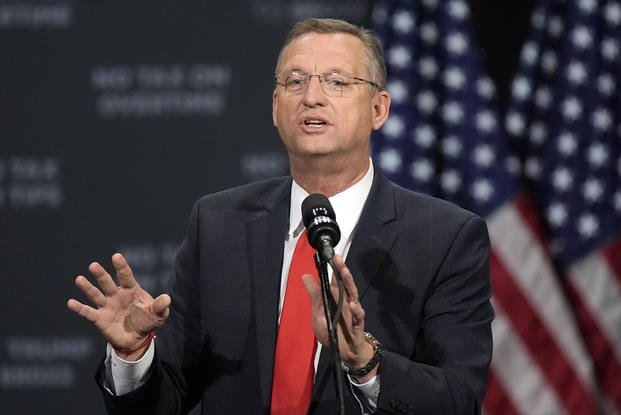
President-elect Donald Trump has nominated an Air Force Reserve chaplain and former congressman to be the next secretary of the Department of Veterans Affairs.
Former Rep. Doug Collins, 58, a Georgia Republican who last ran for office in 2020 when he vied for a U.S. Senate seat, served two years as a Navy chaplain before joining the Air Force as a chaplain after the Sept. 11, 2001, terrorist attacks.
In his announcement Thursday, Trump said Collins, who campaigned heavily for the president-elect, would be a “great advocate for active-duty service members, veterans and military families to ensure they have the support they need.”
Read Next: Police Records Show Defense Secretary Nominee Was Involved in Alleged Sexual Assault in 2017
“We must take care of our brave men and women in uniform,” Trump said. “Thank you, Doug, for your willingness to serve our country in this important role.”
Collins is a colonel in the Air Force Reserve. He deployed to Balad Air Base in Iraq in 2008 with the 94th Airlift Wing, based in Dobbins, Georgia, according to media reports. His most recent duty station was Robins Air Force Base, Georgia, where he served as an individual mobile augmentee to the command chaplain, according to the service.
The Air Force Reserve was asked to provide additional releasable information from Collins’ service record but did not do so by publication.
On the social media platform X, Collins said Thursday that he was honored to accept the nomination, adding that veterans deserve “the best care and support.”
“We’ll fight tirelessly to streamline and cut regulations in the VA, root out corruption, and ensure every veteran receives the benefits they’ve earned,” Collins wrote. “Together, we’ll make the VA work for those who fought for us. Time to deliver for our veterans and give them the world-class care they deserve.”
The VA provides disability compensation to more than 1 million veterans and family members, and roughly 9 million veterans are enrolled in VA health care, the country’s largest integrated medical system.
Collins had previously posted on Veterans Day that he believes the VA’s medical system “is broken and our veterans pay the price.”
“Why does a veteran have to drive 80 miles to see a doctor when they already have trouble seeing to start with? @realDonaldTrump will drain the swamp and make America WIN again,” Collins wrote.
Collins served in Congress from 2013 to 2021 but did not play a prominent role on veterans issues during that time and never served on the House Veterans Affairs Committee. Rather, he made a name for himself as a reliably conservative lawmaker and, in the last few years of his tenure, a staunch ally of Trump’s.
His voting record in Congress got consistently high marks from conservative advocacy groups, including anti-abortion group Susan B. Anthony Pro-Life America giving him an A+ rating for his opposition to abortion as the top Republican on the House Judiciary Committee.
“Contending an unborn child has no life to lose becomes impossible when we reflect — even momentarily — on what an abortion entails,” he said in 2019 at a committee hearing on reproductive health care rights. “One person’s reproductive right cannot outweigh another person’s right to live.”
He also regularly argued against LGBTQ+ rights efforts, including contending a bill to add sexual orientation and gender identity to equal rights protections would “destroy female sports, endanger vulnerable women and promote sterilization of children in a misguided bid to privilege the rights of a few over those of the vast majority of Americans.”
And after the Supreme Court ruled in 2015 in favor of marriage rights for same-sex couples, Collins said he would “strongly support a constitutional amendment defining marriage between one man and one woman.”
While Collins’ focus in Congress was not veterans issues, he voted in favor of major veterans bills on the House floor, including the 2014 Choice Act, the 2018 Mission Act, and the 2017 VA Accountability and Whistleblower Protection Act. A vocal proponent of gun rights, he also voted in support of a bill that wouldn’t become law until after he left Congress that made it easier for some veterans to access guns.
As the ranking member of the Judiciary Committee, Collins became one of the faces of Trump’s defense team during Trump’s first impeachment over his efforts to pressure Ukraine to dig up dirt on now-President Joe Biden. In that capacity, Collins argued Democrats used impeachment as a political weapon to hurt Trump’s chances in the 2020 election.
He’s the fourth member of Trump’s impeachment defense team to be rewarded with a Cabinet appointment after Trump named John Ratcliffe to be CIA director, Lee Zeldin to be Environmental Protection Agency head, and Elise Stefanik to be U.N. ambassador. Collins has continued to advise Trump on legal issues since leaving Congress, including on his efforts to overturn the 2020 election results.
In addition to his top post on the Judiciary Committee, Collins served as vice chair of the House Republican Conference, the fifth-highest position in GOP leadership.
In 2020, Collins opted to run for the Senate rather than reelection to the House. During that campaign — which he lost in an open primary against Republican Kelly Loeffler and Democrat, now senator, Raphael Warnock — he was warned by the Air Force against using campaign ads that pictured him in uniform but did not include a required disclaimer.
Sen. Jerry Moran, R-Kan., who is poised to be chairman of the Senate Veterans Affairs Committee next year and so will lead Collins’ confirmation process, congratulated Collins in a post on social media and said he has “a strong understanding of the policies that impact veterans.”
“President Trump nominated a candidate who has demonstrated his dedication to public service and a willingness to support veterans and their families,” Moran wrote. “I look forward to Congressman Collins’ testimony before the Senate Veterans Affairs Committee.”
Related: ‘He’s Going to Have to Explain It’: Surprise Defense Secretary Pick’s History Takes Center Stage






